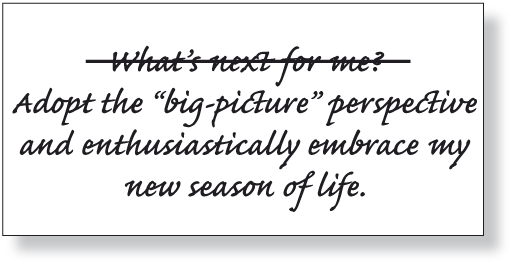The New Eve (26 page)
Authors: Robert Lewis

All eyes now turned to Anne. Everyone half expected to see Anne reveal a perfectly blank card. After all, her acts of service were known to everyone in the church and the community, and her smile could cheer any soul. What could a godly woman like Anne be struggling with? Here was a New Eve if ever there was one.
“It's real simple for me,” said Anne. “On the whole I've had a good life so far. I'm satisfied that I made more good choices than bad ones, primarily because of God's Word and God's grace. My husband and children are doing well, and nothing makes me happier than that. But what now? What do I do with my life now that the kids are all gone? So here's my card.”

“When I was younger, I imagined fifty-six was ancient, the end of the road. You'd be nestled down in a rocking chair somewhere with yarn and knitting needles and wouldn't look up until they came for your body. But what I'm finding now is that fifty-six is
young.
I've got probably thirty years or so ahead of me! I'm not designed to just fold my cards and wait out my
time. No one is. So my challenge is figuring out what I'm supposed to do with the rest of my life.”
“What sort of work did you do before marriage and kids?” asked Patricia.
“Catering. I helped cater weddings, birthdays, graduations … even the inauguration of Governor Jameson. I was the first assistant to Mrs. Carter at Carter Catering. It was a great experience.”
“That explains this,” Brenda said, motioning to the table laden with Anne's preparations. “You've got a real talent there, Anne.”
“Any thought of getting back into that?” Tracey asked. “Take the advice you just gave me?”
“Well, sure. I suppose I think of that some. It's a funny thing, though. Having spent the past twenty-nine years putting all my energies into my family, I've lost a little bit of the initiative for getting out there and doing my work for the public. I'm not sure how it's come to be this way, but new challenges are a little frightening to me now.”
“Start small,” Patricia said matter-of-factly. “Start small, get comfortable, then deepen your involvement as you get your legs under you.”
“Before long you'll be back doing inaugurations!” declared Susan. “And I'll bet I can get you to cater some of the conferences we do at work. You'd be a big hit, Anne.”
“They're right, Anne,” said Brenda. “It's time to relaunch and explore the new opportunities for you. And I have another idea. Instead of focusing on starting a new business, which I know you'd do great at, you could pour your energies into helping feed the needy. I know there are homeless shelters and other non-profits that would love to have you aboard. Think of the impact you could make!”
This set all the ladies to talking about the range of possibilities for Anne. Everyone agreed she had many great options to
consider since she so obviously enjoyed serving others. Anne wrote as she listened and then flashed her card for all to see.
“It's a new day!” Anne declared with a smile. “And a great time to find a new purpose in life.”

As you can see from the previous stories, being a New Eve is not about a static, cookie-cutter, one-for-all lifestyle. It's about you being
you!
God's you. The best you. It's about leaps of faith, bold moves, and deep convictions that refuse to be swayed by the world. It's also about finding and securing the life you've always wanted, a good life without regrets.
Unfortunately, the first Eve came to believe that the best way to have that kind of life was by rejecting God, ignoring His command, and reaching for a glitzier something else. This became the tragic bold move that marked not only her life but also the lives of many millions of Eves since. The New Eve is a woman precisely as daring, except in the opposite way. Her distinction is in the way she tenaciously holds on to God's design and callings as radically as the first Eve abandoned hers. This is the proven path to a rewarding life.
So where do you start? The women in this chapter did a smart thing. They started their New Eve journeys by asking two
questions to give them both a focus and a first step: What is life's biggest challenge for me right now? and What should be my first bold move? If you deeply desire a life that pleases God, that's a good starting place for you too. It's always better to start small and build on a few successes than it is to try too much all at once and then give up.
So what is your biggest challenge as a woman?
And what will be your first bold move as a New Eve?

Bold Femininity
Live from the Inside Out
Adopt a Biblical Definition of Womanhood
Embrace a Big-Picture Perspective on Life
Live with the End in Mind
Use Wisdom with a Man
The New Eve

How You and Your Family Shape the Future
I
originally intended for this material to be included as a chapter in
The New Eve.
However, it soon became apparent that it did not fit the more practical nature of the book, and so it was dropped. I choose to include it here for those of you who may be interested in venturing out into the “deeper” sociological waters of the role family plays in how people and cultures rise and fall.
Marriage and family matter for a lot of reasons: personal fulfillment, loving companionship, raising children, redeeming society, preserving culture, saving civilization, and altering history.
Say what?
You heard me right. The reach of marriage and family extends well beyond our personal needs and wants. It was designed to do far more than merely make us happy. Look back at Genesis, which outlines the blueprints for marriage. Certainly God intended marriage to meet our aloneness needs (Gen. 2:18), but
He also intended it to be a tightly knit, peaceful “battle group” that goes forth to subdue the earth with godly order (Gen. 1:28). Every time a family succeeds in that mission, society is empowered and social order is advanced. Conversely, every time one fails, society is wounded and social order, in one way or another, breaks down.
Marriage and family are that important.
A New Eve knows that. It's a conviction that runs deep within her. She understands that what goes on in her home has a wide range of impacts. By expressing godly values and releasing healthy children, she can change a neighborhood, a city, a state, a nation, or even the world. This is the great, inspiring vision that Genesis casts for marriage and that a New Eve embraces for herself on a personal level. She is right in believing that her home represents nothing less than the future of the world.
History proves that marriage is a social and spiritual mega-force that shapes whole nations one couple at a time. Nations rise and fall, excel and decline, and wax and wane based on the state of their marriages.
In 1947, long before marriage was a controversial subject, Dr. Carle Zimmerman of Harvard University wrote an insightful book called
Family and Civilization.
The goal of his exhaustive research was to discover the impact of different marriage and family models on the state of a civilization. Was there any specific correlation between a nation's fitness—its economic and social well-being—and its family patterns? That was the question at the heart of Zimmerman's study. To find the answer, he examined the institution of marriage across time and culture. He discovered that civilized nations all begin by manifesting one type of family structure, thrive as a second type dominates, and
then inevitably decline under a third model. In other words, he demonstrated a direct correlation between specific family types and the rise and fall of cultures. Some marriage and family models help build empires and nations; others help kill them.
Here, then, are the three family patterns Zimmerman found that marked the life cycle of a civilization.
The trustee model predominates in the early stages of civilization. Zimmerman called it “trustee” because each member of the family, from the young daughter cutting her teeth to the shriveled grandfather who has long since lost his, is
entrusted
with the responsibility of preserving family life and family values. Individual freedoms and personal rights are rare. It's a kin-and-clan-first mentality, and the family members are judged by how well they bear this value out in their choices and actions. Today emerging countries in Africa and the Middle East are marked more or less by this family model.
The trustee family is patriarchal in structure, with men enjoying wide-ranging power over women and children. That power, however, is not arbitrary but is an expression of the will of a larger clan to which the family belongs. Men don't simply make the rules up as they go. They must follow the accepted practices and values of clan life, and this includes protections for the rights and well-being of women and children. Nevertheless, the dominant male is permitted to lead by strength or even physical aggression when members stray from the distinct roles given them.
Societies embrace the trustee model early in their life cycle because it's necessitated by their underdeveloped context. Conditions are difficult at this stage of society. In order for a family to eat and live in security, each family member has to
give selflessly to the team effort. Resources must be hunted, farmed, or mined from the land. All of this requires a no-nonsense approach to life that is pragmatic and productive. Children are seen as an asset—there's plenty they can do in the fields and around the house to help move the family forward. Women play the vital roles of feeding and clothing the family, working in and around the home, as well as adding new members through childbirth. Men, with their strong backs and aggressive bent, work to provide for the family's needs, as well as man the battle lines.
In these conditions there's no time for philosophizing on the larger questions of how gender equality and children's rights might play themselves out in a fully equitable society. Nor is society advanced enough to put forth a strong governing body that can craft and enforce these kinds of civil laws. Thus, clans enforce their own laws for behavior. Tribal rule prevails. However, as the trustee model gradually succeeds in helping society tame the land, develop technologies, and grow in numbers, a more advanced and equitable model of the family appears.